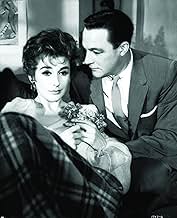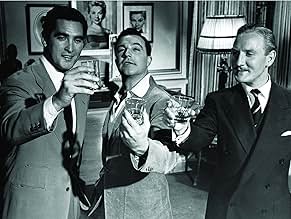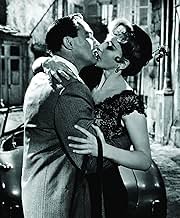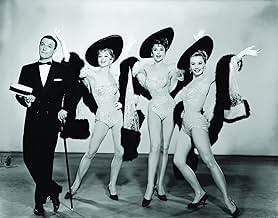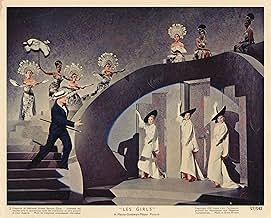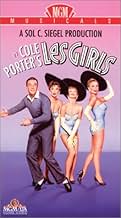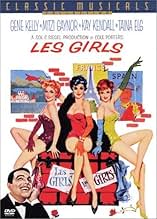VALUTAZIONE IMDb
6,6/10
3220
LA TUA VALUTAZIONE
Aggiungi una trama nella tua linguaThe former members of a dance troupe are suing because of recently published memoirs. Each one insists on own point of view.The former members of a dance troupe are suing because of recently published memoirs. Each one insists on own point of view.The former members of a dance troupe are suing because of recently published memoirs. Each one insists on own point of view.
- Vincitore di 1 Oscar
- 7 vittorie e 7 candidature totali
Richard Alexander
- Stagehand
- (non citato nei titoli originali)
Gordon Armitage
- Courtroom Spectator
- (non citato nei titoli originali)
Frank Arnold
- Taxi Driver
- (non citato nei titoli originali)
Herman Boden
- Angèle's Backup Musician
- (non citato nei titoli originali)
Brad Brown
- Court Barrister
- (non citato nei titoli originali)
Barrie Chase
- Dancer in 'Les Girls' Number
- (non citato nei titoli originali)
Lilyan Chauvin
- Dancer
- (non citato nei titoli originali)
Robert Cole
- Biker in 'Gone About that Gal' Number
- (non citato nei titoli originali)
Recensioni in evidenza
This would have been an enjoyable film without the enchanting comic actress Kay Kendall, but with her it's hilarious. It's a musical comedy version of "Rashomon"; a trial for libel where all the principals give wildly different versions of the same events. Gene Kelly, Taina Elg, and even Mitzi Gaynor are all fun, but it's Kendall who carries the show. She is one of those rare performers who can make you laugh with just a look on her face, but when given something like a drunk scene she can make you weep with laughter. Who cares if she could neither sing nor dance. Good score, too.
Sadly, Kendall made only two more films before her untimely death, what a loss to the world.
Sadly, Kendall made only two more films before her untimely death, what a loss to the world.
I love classic films, but I'm not one for musicals. I like melodramas. With "Les Girls", however, I have to make an exception. This is fun, colorful, comic-musical in which Kay Kendall plays Lady Wren, former member of a European dance troupe, who writes a book exposing the backstage "truths" and scandals. Along comes Taina Elg, also a former member of that troupe, suing Lady Wren for defamation of character. A trial ensues in which we get flashbacks, giving the various points-of-view of how things really happened. Cute and fun from the opening moments of plantiff and defendant entering the courtroom to the flashbacks showcasing Kendall's brilliant comedic abilities and the oft-referred to gin in the perfume bottle sequence. This is truly a good show and Gene Kelly's great too.
As the glory days of M-G-M as Hollywood's preeminent manufacturer of musical treasures entered the sunset years, this very stylish bit of fluff, under George Cukor's very astute guidance, graced the CinemaScope/Metrocolor screen. Cole Porter contributed a score quite a bit more slender than his best, with only one standout, "Ca c'est l'Amour" briefly delivered by Taina Elg. Gene Kelly wasn't permitted any extensive opportunities to display his more athletic dancing skills, possibly because Jack Cole seems to have been the sole credited choreographer. Some viewers, reading other IMDb comments on this one, were rather annoyed by the Rashomon-like structure of John Patrick's very clever, in my view, screenplay. But it's all quite sophisticated, at least for 1957, and the "Ladies In Waiting" production number, in which Porter indulges his penchant for the risque, is hilariously reprised as the story progresses, making naughty use of the three leading ladies' attributes.
Robert Surtees lensed the entire production within the confines of M-G-M's soundstages but, with Cukor's favorite collaborator, Hoyningen-Huene, helping to apply the visual gloss, the whole enterprise is much more elegant looking than Hollywood's usual musical output. Orry-Kelly won a well-deserved Oscar for his color costume design, with one gorgeous gown worn by Mitzi Gaynor that probably accounts for most of the votes cast in his favor.
Finally mention must be made of Henry Daniell's drily witty incarnation of a judge whose patience is sorely tried by the frivolity of the case before him and, of course, Kay Kendall's terrifically funny romp as Lady Wren. What a loss to the cinema when she died so suddenly. Her fans, and I am certainly in their forefront, do so regret her early departure. (If you add this one to your video library, the widescreen DVD is the only way to do it.)
Robert Surtees lensed the entire production within the confines of M-G-M's soundstages but, with Cukor's favorite collaborator, Hoyningen-Huene, helping to apply the visual gloss, the whole enterprise is much more elegant looking than Hollywood's usual musical output. Orry-Kelly won a well-deserved Oscar for his color costume design, with one gorgeous gown worn by Mitzi Gaynor that probably accounts for most of the votes cast in his favor.
Finally mention must be made of Henry Daniell's drily witty incarnation of a judge whose patience is sorely tried by the frivolity of the case before him and, of course, Kay Kendall's terrifically funny romp as Lady Wren. What a loss to the cinema when she died so suddenly. Her fans, and I am certainly in their forefront, do so regret her early departure. (If you add this one to your video library, the widescreen DVD is the only way to do it.)
Cole Porter's final film score and next to last music written for any media is Les Girls. The same team producer Sol Seigal and writer John Patrick who produced and wrote the adaption of The Philadelphi Story for High Society worked with Porter again and this time George Cukor was directing. It's a good film, but I've got the feeling that it could have been a whole lot better.
One of the criticisms that Porter used to get annoyed with was the perennial 'it isn't up to Cole Porter's standard' and then you'd look in the score and see a lot of classics. Can-Can is the best example of that. But in the case of Les Girls Porter admitted this to be true. According to the George Eells biography of Porter, he was starting to suffer the decline in health that would eventually end his life in 1964. He did have surgery to bypass an ulcer and was not feeling up to par.
Still the numbers are mostly for a vaudeville act, Barry Nichols and Les Girls so they're serviceable to a bright Rashomon like plot. The members of the act are Gene Kelly and the girls are Mitzi Gaynor, Taina Elg, and Kay Kendall. Kay's written a memoir that includes an alleged suicide attempt by Elg and she's suing her in an English court. As we get testimony from Elg, Kendall, and Kelly, they all give out with different versions. It's also clear he had his fling with all of them at one time despite his alleged no fraternization policy.
Elg has the best ballad of the score, Ca C'est L'Amour which sounds like something that might have been written for Can-Can and discarded. Cole Porter discards are better than a lot of composer's best efforts. The sparkling Kay Kendall was never shown to better advantage on the screen than with You're Just Too Too in a duet with Kelly. And Cole Porter wickedly satirizes Marlon Brando and The Wild One in Why Am I So Gone About That Gal with Kelly and Mitzi Gaynor.
In addition to this being Cole Porter's last film score, this film also marks Gene Kelly's last full blown musical. He did do other musical numbers in films like What A Way To Go and Young Girls From Rochefort and Xanadu, but this was the last musical he did. They were getting way too expensive to make, something Kelly learned from behind the camera when he directed Hello Dolly.
Even with a score that Cole Porter himself wasn't thrilled with, Les Girls is still a fresh bit of film making. And since it's original to the screen, the Porter wit is not edited severely. All in all four great musical performers, three of them Les Girls.
One of the criticisms that Porter used to get annoyed with was the perennial 'it isn't up to Cole Porter's standard' and then you'd look in the score and see a lot of classics. Can-Can is the best example of that. But in the case of Les Girls Porter admitted this to be true. According to the George Eells biography of Porter, he was starting to suffer the decline in health that would eventually end his life in 1964. He did have surgery to bypass an ulcer and was not feeling up to par.
Still the numbers are mostly for a vaudeville act, Barry Nichols and Les Girls so they're serviceable to a bright Rashomon like plot. The members of the act are Gene Kelly and the girls are Mitzi Gaynor, Taina Elg, and Kay Kendall. Kay's written a memoir that includes an alleged suicide attempt by Elg and she's suing her in an English court. As we get testimony from Elg, Kendall, and Kelly, they all give out with different versions. It's also clear he had his fling with all of them at one time despite his alleged no fraternization policy.
Elg has the best ballad of the score, Ca C'est L'Amour which sounds like something that might have been written for Can-Can and discarded. Cole Porter discards are better than a lot of composer's best efforts. The sparkling Kay Kendall was never shown to better advantage on the screen than with You're Just Too Too in a duet with Kelly. And Cole Porter wickedly satirizes Marlon Brando and The Wild One in Why Am I So Gone About That Gal with Kelly and Mitzi Gaynor.
In addition to this being Cole Porter's last film score, this film also marks Gene Kelly's last full blown musical. He did do other musical numbers in films like What A Way To Go and Young Girls From Rochefort and Xanadu, but this was the last musical he did. They were getting way too expensive to make, something Kelly learned from behind the camera when he directed Hello Dolly.
Even with a score that Cole Porter himself wasn't thrilled with, Les Girls is still a fresh bit of film making. And since it's original to the screen, the Porter wit is not edited severely. All in all four great musical performers, three of them Les Girls.
The musical "Les Girls" (1957) is curious, I suggest for many reasons. It has three leading ladies, only a few very good musical numbers and a plot that is heavy on satirical comedy, with four distinct sections. It is also embedded within a trial about libel and takes part very largely indoors; yet it is arguably filled with clear 'action' from start to finish. John Patrick's screenplay I find clever and the dialog perhaps very good. Vera Casparay's story gave us three different versions of mostly the same events, with a subtle shift forward in time each time. Director George Cukor used shots from heights and clever low angles to give an extra dimension to what otherwise might have been boring indoor shots (in less-capable hands). The film produced by Saul Chaplin and Sol Siegel looks lovely in Technicolor and seems sumptuous as well as convincing throughout, I suggest. The cinematography by Robert Surtees, acting as director of photography, the vivid art direction by Gene Allen and William A. Horning and the set decorations by Richard Pefferle and the great Edwin Willis complement the well-matched art direction very well indeed, in my opinion. Among the film's musical numbers, "Ca C'est L'Amour", "You're Too Too" and the rope ballet seemed the most memorable moments to me. Orry-Kelly's wardrobe and costumes and the musical department's contributions stand out; Jack Cole and Alex Romero are credited with the choreography, no doubt with ideas from the star Gene Kelly. In featured roles, Jacques Bergerac, Henry Daniell as the judge, and Leslie Phillips and Patrick MacNee all make very strong impressions with little to work with. The three ladies in the act "Barry Nichols and Les Girls", are Kay Kendall, Taina Elg and Mitzi Gaynor. Kendall deserves an Oscar for her range of comedy and dramatic moments in the film, by my standards; Mitzi Gaynor is a good dancer and delivers both a decent characterization and some fine one-liners without being vocally strong. Taina Elg is the surprise--by turns charming, mischievous and intelligent; her accent perhaps harmed her opportunity to play more comedies within a shrinking 50's movie industry. Kelly is believable throughout and perhaps has never danced better. This film that retails the interplay among four interesting people on "the road" in Europe in the 1950s is undoubtedly both beautifully directed and professionally mounted. It has, I say as a writer, discreet charm, some nice comedic and emotional moments and a pace that director Cukor and the cast never allow to falter. It deserves more credit than it has ever been given, and I believe awards for some of its finest achievers' work exhibited herein.
Lo sapevi?
- QuizOn the DVD, Taina Elg says the original cast was supposed to include Cyd Charisse as the American girl, Leslie Caron as the French girl, and Kay Kendall as the English girl. Charisse decided to do La bella di Mosca (1957) instead, so Mitzi Gaynor took her part. At one point, Kendall didn't want to do the film and Elg was tested for her role. Kendall took the part after all, but then Caron withdrew. Elg was tested then for THAT character and received her first major film role. Jean Simmons and Carol Haney were also considered for film roles.
- BlooperDuring the European tour, multiple clips are shown of American-style steam locomotives instead of European-type engines.
- Citazioni
Lady Sybil Wren: If I was a man I'd have nothing to do with me.
- ConnessioniEdited into American Masters: Gene Kelly: Anatomy of a Dancer (2002)
- Colonne sonoreLes Girls
(uncredited)
Music and Lyrics by Cole Porter
Performed by Gene Kelly, Kay Kendall (dubbed by Betty Wand), Mitzi Gaynor and Taina Elg
Danced by Gene Kelly, Mitzi Gaynor and Taina Elg
I più visti
Accedi per valutare e creare un elenco di titoli salvati per ottenere consigli personalizzati
- How long is Les Girls?Powered by Alexa
Dettagli
- Tempo di esecuzione1 ora 54 minuti
- Proporzioni
- 2.35 : 1
Contribuisci a questa pagina
Suggerisci una modifica o aggiungi i contenuti mancanti



